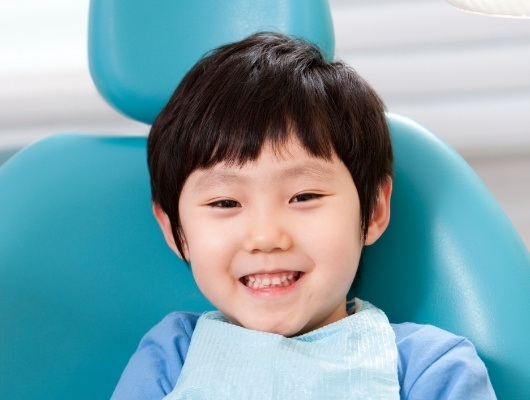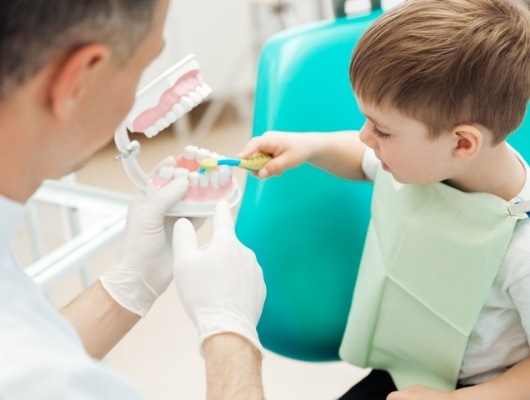Children’s Dentist – Denton, TX
Treating Young Smiles for Brighter Futures

Seeing your child smile is probably one of the highlights of your day. You want to make sure that those little pearly whites stay healthy for the long haul. That means taking great care of them at home and visiting a children’s dentist regularly. At Prime Dentistry, our team welcomes the youngest in your family, too. Keep reading to learn more about our children’s dentistry services in Denton!
Why Choose Prime Dentistry for Children’s Dentistry
- Compassionate & Calming Approach from Our Dental Team
- Custom Mouthguards Available for Young Athletes
- Consistency in Seeing the Same Dentist Each Time
When Should My Child Visit the Dentist?

It may seem early, but the American Dental Association’s recommendation is for a child to visit the dentist for the first time around age one, with regular checkups and cleanings beginning no later than their third birthday. Starting routine dental care early is the best way to help your little one avoid cavities and ensure any issues with dental development are detected early.
What to Expect During Your Child’s First Dental Visit

We always block off plenty of time for a child’s first dental appointment. We want to make sure this visit is laid-back and starts your little one off with a great impression of what it means to visit the dentist! Your child will sit in your lap throughout the appointment, while we take a quick look in their mouth and answer any questions you may have about how to care for their growing smile. After the visit is over, we will send your little one home with a small prize and make plans for you both to come back for another dental checkup in about six months.
At-Home Tips for Oral Health

Taking care of your child’s smile at home requires pretty much the same steps that you take for your teeth and gums. Make sure they brush for two minutes, twice a day, and that they floss between teeth daily. Some kids don’t like dental hygiene, though, so you may need to keep these tips in mind.
Steps for at-home oral hygiene for kids:
- Start a progress chart and set rewards for consistent brushing and flossing
- Model good behavior by taking care of your smile
- Have everyone brush and floss their teeth together
Children’s Dentistry FAQs

Want your child to take better care of their oral health? Need help finding ways in which you can encourage them to spend time brushing, flossing, and rinsing? At Prime Dentistry, we know it’s not always easy, but our team is here to help care for their growing smile as well as provide tips and techniques you can use at home to ensure their smile remains cavity-free. Below are some of the most commonly asked questions about children’s dentistry. We invite you to review the following information and contact our office for any additional inquiries you may have about your child’s dental health. A children’s dentist in Denton will be happy to answer your questions and address any concerns.
WHAT IS THE BEST WAY TO PREPARE MY CHILD FOR THEIR FIRST VISIT?
If you want to make sure their initial visit is a success, a few things you can do at home include:
- Maintaining a positive attitude. Children often pick up on anxiety, fear, and negative comments, so be sure to stay positive about their upcoming appointment and remind them of how important it is to let a dentist take care of their smile.
- Show them pictures of the dentist’s office and staff members to help them become familiar with what and who they will see when arriving for their visit.
HOW SHOULD I CLEAN MY BABY’S TEETH?
Before your baby’s first tooth appears, it is best if you use a damp washcloth to gently wipe their gums free of any residue left behind from feedings. This will keep their gums healthy and clean. Once their first tooth erupts, you can use a finger brush or a small toothbrush with soft bristles to carefully clean the tooth. Once a few of your child’s teeth begin to appear, you will only need a smear of toothpaste (the size of a grain of rice), as your baby will be unable to spit any excess out of their mouth.
ARE DENTAL X-RAYS NECESSARY FOR MY CHILD?
Once your little one reaches the age of 2 or 3, it will be necessary for us to begin taking dental X-rays. These images allow our team to review what is happening beneath the gums to ensure there are no issues with alignment or problems of infection developing. Fortunately, the use of digital X-rays allows us to minimize the amount of radiation and produce more precise and accurate images, which can better assist our team should we need to formulate a treatment plan for your child.
WHY ARE BABY TEETH IMPORTANT?
Baby teeth work like placeholders for permanent teeth. While it is true that they will “just fall out someday,” it’s necessary that they remain in place as long as possible. Should a baby tooth fall out too early, it can pose a significant problem to their adult teeth. Nearby baby teeth will begin to shift out of alignment in an attempt to fill the space. To prevent this, your child’s dentist will need to insert a space maintainer or alternative method of treatment to keep healthy teeth in place until the permanent tooth erupts.
WHAT SHOULD I DO IF MY CHILD USES A PACIFIER OR SUCKS HIS OR HER THUMB?
These non-nutritive habits are common at a young age; however, overuse can lead to serious problems with alignment and tooth eruption. Should you be concerned that your child’s smile could be hindered by these comfort solutions, let us know. We will be happy to offer tips and suggestions on ways to eliminate usage to prevent problems in your child’s smile.





New Patient 1st Visit
Second Opinions

